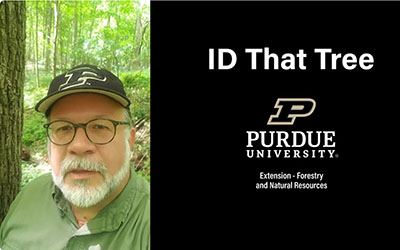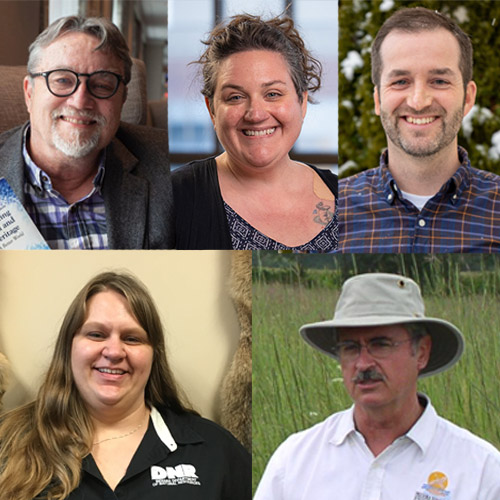FNR Field Reports: Autumn Hall Provides Week 1 Update from Sweden/Finland Study Abroad Trip
Throughout the 2025 Sustainable Natural Resources study abroad course in Sweden and Finland, FNR students will check in to provide weekly updates on the trip highlights. Autumn Hall is going into her senior year as an aquatic sciences major with a wildlife minor. She is the vice president of Alpha Zeta, an honorary professional fraternity for the College of Agriculture. She also is doing undergraduate research in the Aquatic Ecology Lab, studying the movement of Pike-perch through stable isotope analysis of eye lens.
FNR students will check in to provide weekly updates on the trip highlights. Autumn Hall is going into her senior year as an aquatic sciences major with a wildlife minor. She is the vice president of Alpha Zeta, an honorary professional fraternity for the College of Agriculture. She also is doing undergraduate research in the Aquatic Ecology Lab, studying the movement of Pike-perch through stable isotope analysis of eye lens.
During the three-week Sustainable Natural Resources study abroad course students will examine natural resources broadly defined, including forestry, fisheries, wildlife, agriculture, mining, outdoor recreation, and urban sustainability. They will define, discover, and document examples where sustainability of resource use matters. The course explores the effect of terrain, climate, vegetation, faunal assemblages, social structures and technologies on natural resource use. FNR 46000 is a collaboration of Purdue University, North Carolina State University, and the Swedish University of Agricultural Sciences. American and Swedish students work together to research issues in resource management.
The course is co-taught by FNR's Drs. Tomas Hook and Doug Jacobs as well as other instructors from NC State and SLU.
Autumn Hall provides her recap of Week 1 of the trip below.
Monday, June 23, 2025 - Uppsala
To start off our time here we took a tour of the Waste Management and Energy Plant, Vattenfall, in Uppsala, Sweden. This company is state owned but operates similarly to a private company. The energy was initially fueled by oil, but transitioned to other materials like coal and charcoal. Now, with the goal of being “fossil-free”, the company is focusing on the use of wood and biomass. The company produces energy from water, nuclear, wind, solar, biomass, waste and natural gas at plants across Sweden.
For lunch, I went to a poke bowl restaurant that was delicious. On my first day here, I noticed how vigilant Sweden is about recycling paper, metals, plastics and compost. After lunch, our professors mixed North Carolina and Purdue students for a scavenger hunt around the city. There were 20 locations to find and learn about, including Carolus Linnaeus’ tomb and home. Linnaeus was a Swedish biologist and physician who formalized binomial nomenclature. We also saw fish ladders that help migrating species like Asp. Other highlights included cozy coffee shops with excellent chai lattes and bakeries with amazing treats. For dinner, I went out with a group for pizza and discovered that locals tend to eat dinner much earlier than we do.
Tuesday, June 24, 2025 - Uppsala
On Tuesday, we had later start and went to the Swedish University of Agricultural Sciences (SLU) campus in Uppsala. Dr. Höök gave us about a 1.5-hour lecture regarding the Baltic Sea. The focus was on the brackish water, fisheries techniques, common trends and current threats. For lunch, I had a chicken sandwich and french fries, basic I know, but it was amazing.
After lunch, I went to an aesthetic coffee shop, ordered a matcha latte and worked on a reflection of my intercultural skills that was due. I found that I have a lot of room for improvement and plan to immerse myself as much as possible on this trip. For dinner, we went to a small Mexican restaurant with authentic tacos. The rest of the night was spent getting to know the NC State students.
 A collage of images from Uppsala, Sweden
A collage of images from Uppsala, Sweden Wednesday June 25, 2025 - Öregrund
Travel Day! Today we traveled to Öregrund, Sweden. Halfway through our one-hour bus ride we made a stop at Kallriga naturreservat (nature reserve). We had a short half-mile hike where we saw Cow Island, a coastal landscape and a popular birding area for waterfowl and other species.
Back on the bus we continued our journey to the hostel/apartments we were staying at. We had brief meetings for our group projects regarding a topic we plan to cover in the three-week trip. My topic is about aquatic habitats. For dinner, I got a veggie pizza, boring choice according to Dr. Höök but it was good. Then we experienced the grocery store and explored the new town.
Thursday, June 26, 2025 - Öregrund
Today we visited the SLU Institute of Coastal Research near our hostel. We attended three presentations by Lena Bergström, Torbjörn Säterberg, and Lovisa Wennerström. Topics included ecosystem analysis, cormorant issues in the Baltic and herring as a key species in the ecosystem.
The first presentation covered the assessment, research and education conducted at the facility. The second focused on offshore wind energy and its ecological impacts at all levels of the food web. The final talk examined herring, known as the “motor of the ecosystem,” discussing changes in spawning time, otolith aging and migration, and further management considerations.
Afterward, we toured the labs and observed the full processing of fish for analysis, including removing gonads, stomachs, otoliths, eye lenses and livers. I found this particularly interesting since my independent study is on the migration of Swedish pike-perch using stable isotopes in eye lenses.
In the evening, a group of students joined Dr. Höök to taste surströmming or fermented herring, a traditional Swedish dish. It was prepared on a large cracker with butter, mashed potatoes, onion, and the fish on top. It was not my cup of tea, but we washed it down with a shot of aquavit, a common spiced vodka in Sweden.
Friday, June 27, 2025 - Öregrund
Today we went to another Vattenfall location, this time a nuclear power plant. There were a total of three power plants. These plants require a lot of water to cool the systems. The cool water comes from the open Baltic system and is flushed out into a Biotest Lake that is about 8 degrees Celsius warmer.
Researchers use this site to study potential climate change impacts on cold-water ecosystems. For example, diet comparisons show more invertebrates and parasites in the stomachs of fish from the Biotest Lake, while fish from the open system have more fish in their diet. Studies also indicate that fish in Biotest grow faster but die younger. Bird presence is higher, and invasive species seem to thrive in warmer conditions.
After the tour, I took a long nap and spent the evening relaxing with peers at the hostel.
Saturday June 28, 2025 Öregrund
Free Day! Today most students took advantage of sleeping in. With nothing on the schedule a few friends and I went to Gräsö Island. We had to take a quick 5-minute ferry and then we went straight to walking around. We found a small hiking trail and got to see cows and lots of snails. Then we went to a local restaurant. I got a summer sandwich, flatbread with salmon, greens, potatoes and lemon mayo.
When it started to sprinkle and turn cold, my group headed back to the hostel. Once the weather cleared up, we went to the shore to relax and admire the scenery. We cooked dinner at the hostel and wrapped up the day by going to a bar with live music to finish off the day.
 A collage of photos from Week 1 of the Sweden/Finland study abroad trip
A collage of photos from Week 1 of the Sweden/Finland study abroad trip  A collage of images from Week 1 of the Sweden/Finland study abroad trip
A collage of images from Week 1 of the Sweden/Finland study abroad trip Sunday, June 29, 2025 - Öregrund to Mariehamn, Finland
Travel day! We left Sweden for Finland. The day started with a one-hour bus ride to the ferry. Along the way, we passed mostly open countryside and a large solar farm. The two-hour ferry ride felt like a mini cruise, with a bar, dining area, rooms and a small shop. I spent most of the ride typing up these journal entries.
After the final one-hour bus ride, we arrived at our hotel in Åland. We spent the rest of the day exploring the new town. Many shops were closed since it was Sunday, but we found a burger place, Me Gusta Burgers, with excellent food.
 A collage of images from the Sweden/Finland study abroad trip by Autumn Hall
A collage of images from the Sweden/Finland study abroad trip by Autumn Hall  A collage of images from Week 1 of the Sweden/Finland study abroad trip by Autumn Hall
A collage of images from Week 1 of the Sweden/Finland study abroad trip by Autumn Hall 





